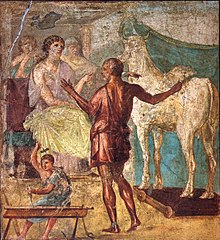Pasiphae
Pasiphaë ( ancient Greek Πασιφάη Pasipháē , "who shines for everyone") was the daughter of the sun god Helios and the Oceanid Perse (is) , at the same time sister of Kirke , Perses , Aietes and Aloeus . She was the wife of King Minos of Crete , with whom she had eight children: Akakallis , Androgeos , Ariadne , Deucalion , Glaucus , Katreus , Phaidra and Xenodike .
As punishment for the fact that her husband Minos had not sacrificed a bull created by Poseidon because of its extraordinarily beautiful shape, but rather used it to refine his herd, Poseidon let Pasiphaë burn in love for that Cretan bull . In order to unite with him, she had Daidalos , who was living in exile in Crete at the time, make a hollow wooden cow that she could crawl into. From this love act with the bull the Minotaur came from .
Like her niece Medea , Pasiphaë knew how to make potions from magical herbs. To make sure that Minos was her marital loyalty, she cast a spell on him that made Minos ejaculate snakes, scorpions and millipedes every time he was present. In this way Minos killed several of his concubines. The only one who could associate with Minos with impunity was Prokris , the daughter of Erechtheus ; she had previously armed herself against the poison of the animals with the essence of a medicinal plant. In another version, Prokris healed the Cretan king from his suffering and received an infallible spear and a fast, immortal dog as a gift.
The Jupiter moon Pasiphae is named after her.
literature
- Robert von Ranke-Graves : Greek Mythology. Sources and interpretation I. Rowohlt. Reinbek near Hamburg 1969.
- Robert von Ranke-Graves: Greek Mythology. Sources and interpretation II. Rowohlt. Reinbek near Hamburg 1974. ISBN 3-499-55115-2 .
- Gustav Türk : Pasiphaë . In: Wilhelm Heinrich Roscher (Hrsg.): Detailed lexicon of Greek and Roman mythology . Volume 3.2, Leipzig 1909, Col. 1666–1673 ( digitized version ).
Web links
Remarks
- ↑ Libraries of Apollodorus 3,1,2.
- ↑ Bibliotheke of Apollodor 3,1,3-4; Hyginus , Fabulae 40; Karl Kerényi : The Mythology of the Greeks. dtv 1345, Munich 1973 ISBN 3-423-01345-1 , Volume I, p. 89.
- ↑ Libraries of Apollodorus 3,15,1; see. Antoninus Liberalis , Transformations 41.
- ↑ Karl Kerényi: The mythology of the Greeks. dtv 1346, Munich 1973, ISBN 3-423-01346-X , Volume II, p. 229.
